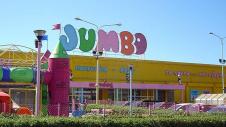Apostolos Vakakis still holds the scepter as the king of Greek retail trade, but the year of the pandemic did not leave him and Jumbo unscathed, raising many questions about the future of the group, its administrative practices and business model.
The largest listed company in retail trade on the Athens bourse, a share that is especially popular with foreign institutional investors, had accustomed the market to continuous growth, high profitability and a generous dividend policy. The last year that Jumbo shareholders remember as being difficult was in 2013, when profitability was hit hard when 58 million euros in deposits in Cyprus took a haircut.
The pandemic and the restrictive measures imposed on trade twice in 2020 were more difficult conditions out of the control of Apostolos Vakakis, but it seems that they affected Jumbo more than expected:
- Analysts had been anticipating until October that Jumbo 2020 sales would decline at a rate in the single digits. Pantelakis Securities, for example, in an analysis published on October 19, forecast a sales decline for the whole year of 8%, slightly less than -9% in the 9 months.
- The final result announced by the listed company was much worse, with the reduction of sales approaching 20%. In particular, the lockdown cut sales by 35%, while December, traditionally one of the strongest months for Jumbo, was much worse as consolidated sales plummeted by 54%.
Tensions with the government
During the second lockdown, it is no coincidence that Apostolos Vakakis looked nervous and almost openly attacked the government for its choices in managing the pandemic. As stressed in a statement by Jumbo, "the Greek government has achieved many undoubted successes in the health sector but has seriously injured Greek retail."
Vakakis seems to have made his plans based on the government's initial plan to close the economy in November, so that there will be a restart in December. When epidemiological data overturned this plan, he allegedly put very strong, if not extreme, pressure on the government to restart the retail trade. Reports have surfaced about a businessman who threatened to move his group's headquarters to Bulgaria, indicating the head of Jumbo, something that has not been confirmed by government officials.
Resilient business model but…
Analysts monitoring the group stress that Jumbo's business model remains resilient. The company supplies very cheap products, mainly from China, and offers consumers a rich menu of different goods at relatively low prices, through a wide network of stores. At present, and regardless of the new data created by the pandemic, Jumbo's impressive profit margin (around 50% gross and over 20% net) remains very high for the sector and creates optimism on its medium-term prospects.
However, the management of the pandemic reduced the glamor of the Vakakis administration and raised several questions about its adequacy, while challenging its business model:
- In terms of tactics, the strong man of Jumbo made a very high-risk move, without a successful result, which is not yet clear how it will be reflected in group profitability. In anticipation of the expected resumption of the market in December, Jumbo proceeded with large orders of products from China, in an effort to make up the losses of previous months during the Christmas period. Thousands of containers, however, were left at the port of Piraeus after the postponement of the opening of the stores and it is not clear when and at what prices this stock will be available. According to analysts, Vakakis took a big risk and lost.
- At a strategy level, Vakakis showed a difficulty in adopting new e-commerce practices. This channel was not sufficiently developed before the pandemic, as only 2.5% of total sales were made online. Despite the shock of the first lockdown and the fact that it took six months until the next one, the company was content with a moderate upgrade of its infrastructure, allowing for online revenues amounting to 2.5% to reach 4.5% of total sales. The upgrade proved to be desperately inadequate during the lockdown, when Jumbo's e-commerce system virtually collapsed from the volume of orders and the company simply announced to consumers that "your love has drowned us". According to analysts, the problem of Jumbo's digital presence has structural features, as the huge number of diverse product codes (from toys to household items) creates a logistics nightmare. This difficulty in adapting to e-commerce may prove to be a serious problem for the chain in the future, as analysts agree that the e-commerce shift will be permanent after the pandemic and is necessary even for groups with strong physical networks.
There are also questions about the administrative practices of Vakakis:
- Vakakis continues to run the group as a "one man show" without any sign that other executives may be capable of taking on the company, when needed. This is creating risks for investors with a long-term view of the company.
- Questions about the company from the pre-pandemic era continue to linger, such as how it will best use large cash reserves exceeding 320 million euros. When the dust from the crisis settles and the large emergency liquidity needs disappear, Vakakis needs to present a convincing plan for the utilization of these funds.






